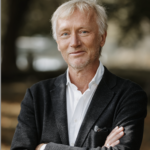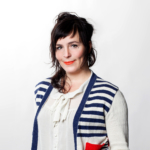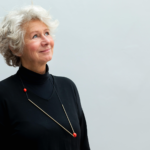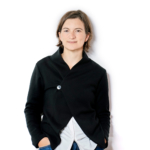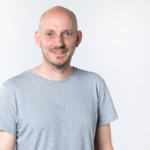Designing Technological Futures
Laura Popplow
Is a design-researcher interested in codesigning the transforming relationships between humans, algorithmic creatures and other more-than-humans. Her PhD „co.making participation in transformation?“ (Kunstuni Linz 2020) crosses the fields of participatory design and the emerging discipline of transformation design. She studied cultural science & communication at the University Hildesheim and ESAD Caldas da Rainha Portugal (Diploma in 2008) and Media Arts & Design at the Academy of Media Art Cologne (Postgraduate Diploma 2011).
Before joining the KISD to establish the new interdisciplinary BA program Code & Context, she has worked as an interdisciplinary artist, designer and design-researcher for more than a decade. She has exhibited internationally in venues and festivals like ISEA, DMY International Design Festival Berlin, Pixelache Helsinki, NORDES Kopenhagen and Vienna Art Week. Some of her collaborative works include a network of fungi experts, amateurs and designers (fungutopia 2009-2014), participatory (sub-)urban practices (Mühlenkampf 2010-2012), feedback as art form (Raumfaltung 2011-2014) and a strategic urban design consultancy (co.city lab 2016-2018). She coordinated the first Interaction Design BA at the University Wuppertal (2012-2015), was a lecturer at HS Mainz (2014-15), taught Social Design at the University of Arts and Design Linz (2015-16) and Design Research at HS Mannheim (2019). She was a guest researcher at the CODE Codesign Research Centre at KADK Copenhagen and Medialab Prado (2016-17) and has published in conferences, books and journals.
Designing Technological Futures
Designing more diverse, just and sustainable futures needs to build transformability – „ […] the capacity to create untried beginnings from which to evolve a fundamentally new way of living when existing ecological, economic, and social conditions make the current system untenable” (Stockholm Resilience Center 2012). Instead of focusing on a distant, abstract future rescued by high tech, in designing futures and technologies alike we need to consider situated contexts. To understand, notice and work with these contexts of humans, things and places is the first task of what Tony Fry has called „design futuring“ (2008) to enable livable futures through design.
This includes a focus away from innovation towards both speculative and critical approaches in design, but also a practice of exnovation, of hospicing those practices and technologies that have become unbearable, unsustainable or defuturing (Fry 1999, Machado de Oliveira 2021). Designing for transformability therefore includes both to design for the ending of untenable systems as well as to create new social imaginaries and new beginnings. It means to develop a new form of kinship with the world, designing within our relatedness with other living and non-living things.
As Ursula K. Le Guin has put it: „[…] the essence of modern high technology is to consider the world as disposable: use it or throw it away. […] It’s easy to say we need recyclable, sustainable technologies, old and new pottery making, bricklaying, sewing, weaving, carpentry, plumbing, solar power, farming, IT devices, whatever. But here, in the midst of our orgy of being lords of creation, texting as we drive, it’s hard to put down the smartphone and stop looking for the next technofix. Changing our mind is going to be a big change. To use the world well, to be able to stop wasting it and our time in it, we need to relearn our being in it. Skill in living, awareness of belonging to the world, delight in being part of the world, always tends to involve knowing our kinship […] our fellowship as creatures with other creatures, things with other things.“ (Ursula K. Le Guin at the conference „Anthropocene: Arts of Living on a Damaged Planet“, University of California, Santa Cruz, May 2014).
Kontakt
Köln International School of Design
Standort Mülheim
Schanzenstraße 28
51063 Köln
laura.popplow@th-koeln.de
+49(0)221 | 8275-5291




